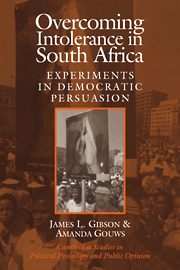Book contents
- Frontmatter
- Contents
- List of Tables and Figures
- Preface
- Part I Introduction
- Part II South African Intolerance as It Is
- 3 The Nature of Political Intolerance in South Africa
- 4 Social Identities, Threat Perceptions, and Political Intolerance
- 5 Making Tolerance Judgments: The Effect of Context, Local and National
- Part III South African Tolerance as It Might Be
- Appendix A Research Design and Methodology
- References
- Index
- Books in the series
5 - Making Tolerance Judgments: The Effect of Context, Local and National
Published online by Cambridge University Press: 22 October 2009
- Frontmatter
- Contents
- List of Tables and Figures
- Preface
- Part I Introduction
- Part II South African Intolerance as It Is
- 3 The Nature of Political Intolerance in South Africa
- 4 Social Identities, Threat Perceptions, and Political Intolerance
- 5 Making Tolerance Judgments: The Effect of Context, Local and National
- Part III South African Tolerance as It Might Be
- Appendix A Research Design and Methodology
- References
- Index
- Books in the series
Summary
In most studies of political tolerance, researchers investigate relatively abstract and context-free attitudes, using measures such as: “Suppose [an] admitted Communist wanted to make a speech in your community. Should he be allowed to speak, or not?” Tolerance is conceptualized as a generalized willingness to allow unpopular political views to be expressed. Such questions are asked annually in the General Social Survey (GSS), for instance, and are widely analyzed by social scientists (e.g., Gibson 1992a; Bobo and Licari 1989; Karpov 1999).
Attitudes of this kind are no doubt important, but they may not tell the full story of how people form opinions when it comes to actual civil liberties disputes. Actual civil liberties controversies may well be more contextualized than suggested by the relatively abstract measures that are typically employed by researchers. Disputes over civil liberties typically turn on context – who is speaking is important, what is being said is important, and where the speaking will take place is important. People certainly employ general predispositions in judging actual civil liberties controversies, but their general predispositions are thought by many to interact substantially with a variety of contextual elements.Consequently, knowing one's predispositions on matters of political tolerance may not necessarily generate successful predictions about whether one will tolerate a specific group acting within a particular context (Marcus et al. 1995).
Some earlier research on controversies over civil liberties explicitly incorporates this concern with context. For instance, Gibson and Bingham (1985) analyzed the dispute in Skokie, Illinois, over the attempt of members of the National Socialist Party of America, a Nazi group, to hold a demonstration in the village.
Information
- Type
- Chapter
- Information
- Overcoming Intolerance in South AfricaExperiments in Democratic Persuasion, pp. 95 - 116Publisher: Cambridge University PressPrint publication year: 2002
